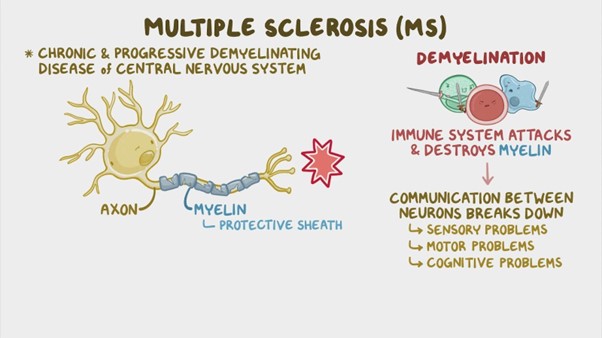A nurse is providing teaching to a client who has a new diagnosis of multiple sclerosis. Which of the following statements should the nurse make?
"Use a cane when walking to maintain your balance."
"Plan to take a hot bath once a week to reduce stress."
"Engage in a rigorous exercise program to maintain muscle tone."
"Place a scatter rug in your bathroom to prevent falling"
The Correct Answer is A
Choice A reason:
"Use a cane when walking to maintain your balance" is the correct statement Multiple sclerosis (MS) is a chronic autoimmune condition that affects the central nervous system, leading to various neurological symptoms. Mobility and balance issues are common among individuals with MS, and using a cane can be helpful in providing stability and support while walking. It can also reduce the risk of falls and improve the client's overall safety and confidence when ambulating.
Choice B reason:
"Plan to take a hot bath once a week to reduce stress” is not appropriate statement. Heat sensitivity is a common symptom in individuals with MS, and exposure to heat, such as hot baths or saunas, can exacerbate MS symptoms. It is generally advisable for individuals with MS to avoid excessive heat exposure as it can worsen fatigue and other neurological symptoms.
Choice C reason:
"Engage in a rigorous exercise program to maintain muscle tone" is not appropriate. While exercise is beneficial for individuals with MS, particularly in maintaining muscle strength and flexibility, it is essential to avoid a rigorous or overly strenuous exercise program. High-intensity exercise may lead to increased fatigue and exacerbation of MS symptoms. A personalized exercise plan that considers the individual's specific abilities and limitations is recommended.
Choice D reason
"Place a scatter rug in your bathroom to prevent falling" is not appropriate statement. Placing a scatter rug in the bathroom is not advisable, especially for individuals with mobility and balance issues like those with MS. Scatter rugs can create tripping hazards and increase the risk of falls. It is essential to keep the bathroom floor clear and use non-slip mats to improve safety.

Nursing Test Bank
Naxlex Comprehensive Predictor Exams
Related Questions
Correct Answer is B
Explanation
- Urinary output is an important indicator of fluid balance and kidney function. After delivery, a woman may experience increased urinary output due to the loss of excess fluid that was retained during pregnancy and the diuretic effect of oxytocin, which is released during breastfeeding. This is a normal and expected finding in the postpartum period.
- However, increased urinary output may also be a sign of urinary retention, which is the inability to empty the bladder completely. Urinary retention can occur due to trauma to the bladder or urethra during delivery, swelling or hematoma of the perineum, epidural anesthesia, or decreased bladder sensation.Urinary retention can lead to complications such as infection, bladder distension, or postpartum hemorrhage.
- Therefore, when a woman who delivered a normal newborn 24 hours ago reports that she seems to be urinating every hour or so, the practical nurse (PN) should measure the next voiding, then palpate the client's bladder. This will help to assess the amount and quality of urine and the presence or absence of bladder distension. A normal urine output is about 30 ml per hour, and a normal bladder should feel soft and empty after voiding. If the urine output is low or high, or if the bladder feels firm or full after voiding, the PN should report these findings to the primary healthcare provider for further evaluation and intervention.
Therefore, option B is the correct answer, while options A, C, and D are incorrect.
Option A is incorrect because catheterizing the client for residual urine volume is an invasive procedure that should only be done if indicated by the primary healthcare provider.
Option C is incorrect because evaluating for normal involution and massaging the fundus are related to uterine function, not urinary function.
Option D is incorrect because obtaining a specimen for urine culture and sensitivity is not necessary unless there are signs of infection, such as fever, dysuria, or foul-smelling urine.
Correct Answer is A
Explanation
A. "We can expect the hospice nurse to provide support for us after our mother's death." This statement indicates that the family understands that hospice care includes bereavement services for up to one year after the death of a loved one.
B. "A hospice nurse will come to the house each time our mother needs pain medication." This statement indicates that the family does not understand that hospice care involves teaching them how to administer pain medication and other comfort measures to their mother at home.
C. "Now that my mother is receiving hospice services, we will not be able to get respite care." This statement indicates that the family does not understand that hospice care offers respite care, which allows them to take a break from caregiving for a short period of time.
D. "Hospice care focuses on arranging treatment that will prolong our mother's life." This statement indicates that the family does not understand that hospice care focuses on providing palliative care, which aims to relieve pain and suffering, rather than curative treatment, which aims to extend life.
Whether you are a student looking to ace your exams or a practicing nurse seeking to enhance your expertise , our nursing education contents will empower you with the confidence and competence to make a difference in the lives of patients and become a respected leader in the healthcare field.
Visit Naxlex, invest in your future and unlock endless possibilities with our unparalleled nursing education contents today
Report Wrong Answer on the Current Question
Do you disagree with the answer? If yes, what is your expected answer? Explain.
Kindly be descriptive with the issue you are facing.
